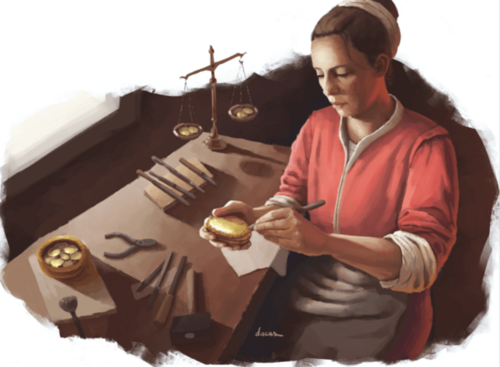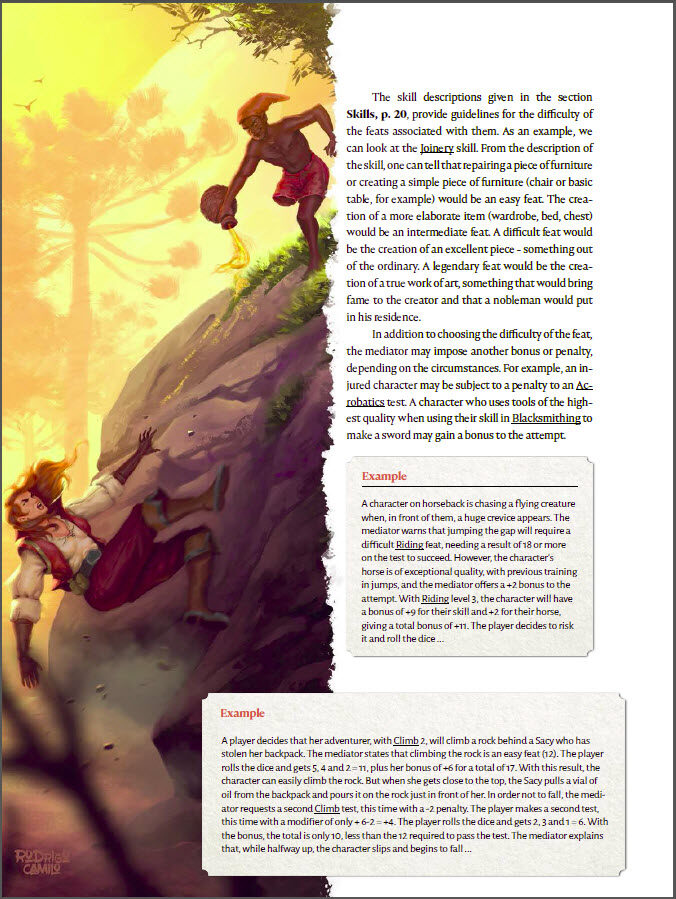Part 2 of a series looking at The Elephant & Macaw Banner Roleplaying Game - see part 1, the overview, here: "What is The Elephant & Macaw Banner Roleplaying Game?"
The game is coming to Kickstarter at the end of January 2020, translated into English by yours truly. To be notified automatically when it goes live, follow this link and click the "notify on launch" button.
How to do stuff in The Elephant & Macaw Banner RPG

The core mechanic of EAMB is a straightforward 3d6 + modifiers task resolution roll, with a binary pass/fail outcome. If you've played mainstream tabletop RPGs before, you'll have no trouble with this.
Here's the opening text of the "Skills and Feats" section – don't panic, they're not that kind of feat.
The system that we use to determine the success or failure of characters’ actions is based on skills and tests of these skills, which we refer to as feats. We offer this system to resolve risky actions and combat, but it is important to keep in mind that the main focus should be the portrayal of the characters and the ways they work together to find solutions to their problems. It is not always necessary to fight in order to win a battle, and as has been said in the adventures of Gerard van Oost and Oludara, “a sharp mind is more useful than a sharp sword”.
Skills come in three levels: Apprentice (1), Practitioner (2) and Master (3).
Those translate to +3, +6 and +9 to your roll when you attempt a feat of your skill. Now, why 3d6 and modifiers in ranks of 3, rather than, say, 2d6 and modifiers in ranks of 1? I don't know for sure, and there are actually good probability-curve-based reasons you might do so, but this game is widely used in schools in Brazil, and I have a sneaking suspicion Chris did this to make kids practise their mental arithmetic.
EAMB is one of those games where the GM has to set a difficulty level: fortunately, the skill descriptions provide benchmarks for difficulty levels, because this is often a hassle. Especially if you don't know the setting well, whether historical or fictional. How difficult is it to make a horseshoe? I genuinely have no idea. Not that you would normally roll to make a horseshoe, unless you need to shoe that horse before an angry mob arrives or something.

Personally, if in doubt I default to "Easy feat, but with terrible consequences" – your chance of success might be 95% but it's still tense if something important is on the line.
Anyway, here's the text about difficulty levels. You can get all this for free in the Player's Guide, incidentally, if you want to see it in context.
When a player wants to use their character’s skill to resolve a challenging or risky situation, the outcome is not certain, and something serious is on the line, we call this a feat. We separate feats into four categories:
Easy feat – Characters with level 1 in this skill succeed most of the time (depending on the outcome of a roll of the dice). For characters at the practitioner stage (level 2), these tasks become almost routine, and the success rate is very high.
Intermediate feat – A task beyond the competence of beginners. The success rate for characters with level 1 in the skill is low. When you reach mastery (level 3), however, even these tasks become routine.
Difficult feat – Such a difficult challenge that even the greatest masters (level 3) have no guarantee of success.
Legendary feat – Only for extraordinary cases, these feats challenge the true limits of human capability. Even masters (level 3) have less than a 50% chance of accomplishing such a feat.
You can also attempt feats of most skills even if you have no training (the book gives the example of someone without any Swimming trying not to drown) but only if the feat is Easy or Intermediate. You can't, however, use languages or craft skills without training: no improvising a pair of leather shoes based on guesswork.
And... actually, that's kind of it for the system. Sometimes having good equipment will give you a bonus - for example, you get +2 to Foraging rolls if you have a trained dog to help you - and the GM ('mediator' in EAMB) can apply penalties or bonuses, but generally your skill level is the only modifier, which keeps things nice and simple.
There's more specific stuff in the skills, but I think I'll cover that in a future blog post. Before then, the next one will be about... the game mechanics!

Comments